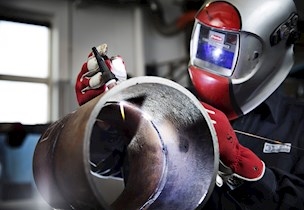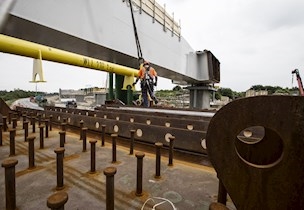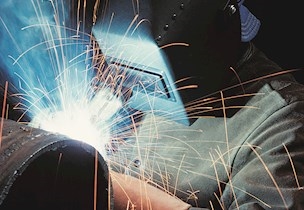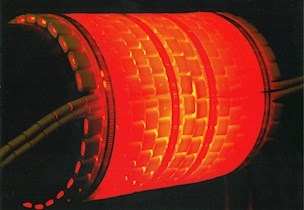Certification of welders
Certification of welders and welding operators is usually a requirement on e.g. welding pressure equipment and steel structures. FORCE Certification A/S can certify you and your welders to be able to perform the welding tasks.
Steps in the certification of welders
Welders can be certified either in their own company or at FORCE Technology´s locations in Scandinavia. Certification is performed according to standards for materials and application area. When the welder holds the necessary qualifications, he will be recommended to enter for an examination, which will be completed with a certificate.
The certification may be performed in the following steps:
- Assessment of the welder’s professional qualifications
- Welding of welding sample according to WPS (Welding Procedure Specification)
- Testing of welding sample (non-destructive testing (NDT) and possible mechanical testing)
- Issue of certificate.
Examination of the welder’s practical skills and theoretical knowledge is performed by FORCE Certification A/S, which is accredited by DANAK (The Danish Accreditation Fund) as certifying body for approval of welders etc.
All examiners are approved by FORCE Certification A/S and have an education within the international welding educations EWF/IIW or similar, which guarantees that the issued accredited certificate lives up to European and International requirements.
Get your welding certificate on paper or digitalised
Testing and issue of a certificate are usually completed within a week. You may receive the certificate either digitalised or printed on paper. When the certificate is issued digitalised, as a customer, you will become registered in FORCE Certification A/S’s on-line database.
From this you will receive information on biannual confirmation and extension of the certificate. Your company performs the biannual confirmation of the welder’s certificate in FORCE Certification A/S’s server.
Furthermore, all welders will get a plastic card, holding a QR code which will allow read-only access to the welder’s certificates.
If the examiner judges that the welder is not capable of passing the welding test, the welder will be referred to conduct further training. FORCE Technology is able to train the welder at the locations at Brøndby, Middelfart, Esbjerg and in Aalborg.
Standards for certification of welders
FORCE Certification A/S is accredited by DANAK for certification of welders for a number of international standards:
- DS/EN ISO 9606-1 Qualification testing of welders – Fusion welding – Part 1: Steels
- DS/EN ISO 9606-2 Qualification testing of welders – Fusion welding – Part 2: Aluminium
- DS/EN ISO 9606-3 Approval testing of welders – Fusion welding – Part 3: Copper
- DS/EN ISO 9606-4 Approval testing of welders – Fusion welding – Part 4: Nickel
- DS/EN ISO 9606-5 Approval testing of welders – Fusion welding – Part 5:Titanium and zirconium
- DS/EN ISO 14732 Welding personnel – Qualification testing of welding operators and weld setters for mechanised and automatic welding of metallic materials.
The 5 ISO 9606-x standards all apply to handheld welding, while ISO 14732 is for welding operators, who perform either automated or mechanical welding. Welders and welding operators, who are certified according to these standards, are also approved for welding pressure equipment in accordance with the PED Pressure Equipment Directive. Apart from the 6 mentioned standards, FORCE Certification A/S is also accredited for certifying track welders according to:
- BN2 Track standard - Approval of welders and operators for track welding processes (DK).
You can also have welders and brazers certified for other standards:
- ASME IX Welding, brazing, and Fusing Qualifications
- AWS D1.1 Structural Welding Code – Steel
- AWS D1.2 Structural Welding Code - Aluminium
- AWS D1.6 Structural Welding Code – Stainless Steel
- DS/EN ISO 13585 Brazing – Qualification test of brazers and brazing operators.
This activity is not accredited and is thus performed by FORCE Technology.
NORWAY:
What standards for certification of welders do we follow?
Our Certification Body (CB) FORCE Technology Certification is appointed third party by Norwegian authority, Norwegian Directorate for Civil Protection (dsb), within the following:
- Certification of welders, welding operators and brazers/brazing personell Approval of welding and brazing procedure qualification (WPQR/BPQR)
Some of the standards we follow:
- ISO 9606-1 Qualification testing of welders – Fusion welding – Part 1: Steels
- ISO 9606-2 Qualification testing of welders – Fusion welding – Part 2: Aluminium and its alloys
- ISO 9606-3 Approval testing of welders – Fusion welding – Part 3: Copper and copper alloys
- ISO 9606-4 Approval testing of welders – Fusion welding – Part 4: Nickel and Nickel alloys
- ISO 9606-5 Approval testing of welders – Fusion welding – Part 5: Titanium and zirconium
- ISO 14732 Welding personnel – Qualification testing of welding operators and weld setters for mechanized and automatic welding of metallic materials
- ISO 13585 Brazing – Qualification test of brazers and brazing operators
The 5 ISO 9606-x standards all apply to handheld welding, while ISO 14732 is for welding operators that perform either automated or mechanical welding. Welders and welding operators that are certified according to these standards are also approved for welding pressure equipment, in accordance with PED Pressure Equipment Directive.
You may also have certified welders and brazers for other standards*:
- ASME IX Welding, brazing, and Fusing Qualifications
- AWS D1.1 Structural Welding Code – Steel
- AWS D1.2 Structural Welding Code - Aluminium
- AWS D1.6 Structural Welding Code – Stainless Steel API 1104 Welding of pipelines and related facilities
*This activity is not accredited and the certificate/approval sheet will not carry the accreditation logo.
Do not hesitate to contact us if you would like to receive more information, or if you have any questions or inquiries.
Related services

Welding consultancy – Improve weld quality
If you need to optimise and improve welding processes or find the reason for welding defects.

Welding inspection
Inspection of the welding work is crucial in order to obtain the proper quality.

Development and prototyping of novel welding procedure
Get help assessing the requirements and consequences of novel welding procedures.



